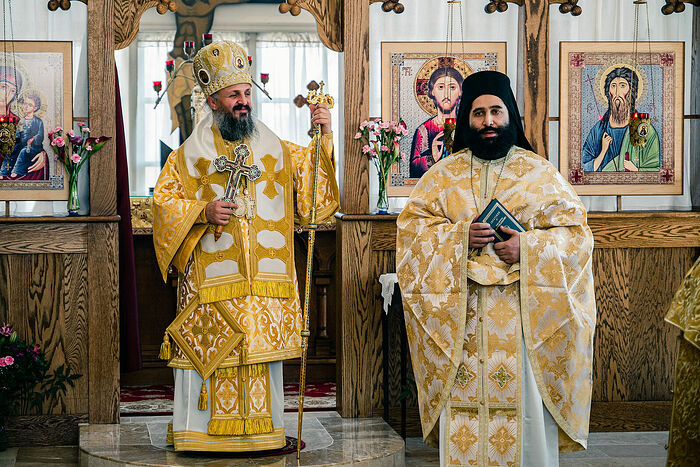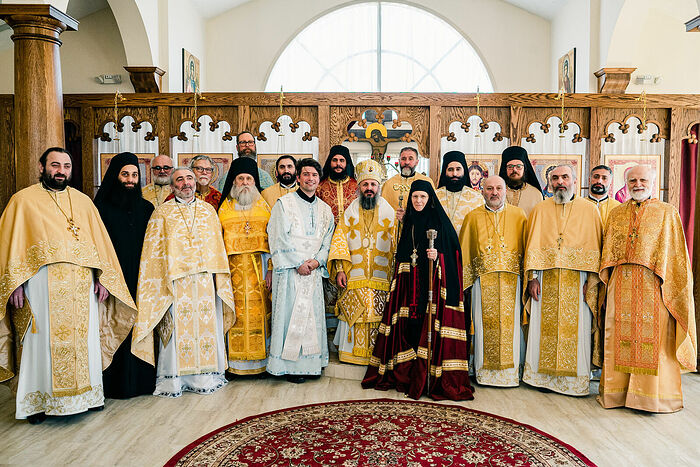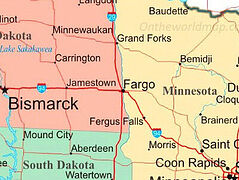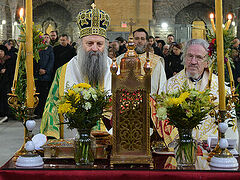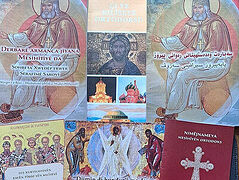Union Bridge, Maryland, February 16, 2023
On Saturday, February 4, with the blessing of His Holiness the Catholicos-Patriarch of Georgia Ilia II, His Grace Bishop Saba of the North American Diocese of the Georgian Orthodox Church ordained Hierodeacon Madai (Maamdi) to the priesthood. The ordination took place in the Monastery of Saint Nina in the state of Maryland, USA.
This is one of the brightest days in the life of contemporary Kurdish Christians, because in their young community there has appeared a priest who has the blessing to conduct Divine Services in Kurdish.
In an interview given to the Kurdish television channel Rudaw, Bp. Saba characterized the event thus:
Today is a special day which shows that in the Orthodox Church no one nationality dominates, because in Holy Scripture it says that there is no difference between Jews, Greeks, Romans, and representatives of other peoples—all of us are one in God.
This is an important, historic day, because Kurds now have the first priest, hieromonk, who labors much in the work of spreading the Gospel of the Lord Jesus Christ.
Fr. Madai translated and published the first Christian texts in Kurdish (Kurmanji and Sorani). I congratulate him; I wish him God’s grace and mercy so that he might do even more for Kurdish Christians and not only Christians. For him, as a good pastor, to become an example for his people, a preacher of the Christian faith amongst Kurds and a guide for them to the Church of Christ.
Fr. Madai was born in Tbilisi in a Yazidi family. He moved with his relatives to Moscow in 2002, where he accepted Christianity and, according to the call of his heart, entered the missionary school founded by the Martyred Fr. Daniel Sysoyev.
Following the martyric death of his mentor, the future hieromonk became acquainted with the well-known Greek Elder Dionysios (Kalambokas), who later became his spiritual father and constant inspiration on his life’s journey.
In 2014, he received the monastic tonsure with the name of Madai, the grandson of Noah, ancestor of the eastern Iranian peoples (Madais-Medes), one of which are the Kurds. In the same year he entered the University of Athens, which he completed his degree with distinction in 2019.
In 2022, the first Orthodox books translated by Fr. Madai were published in two Kurdish dialects in Tbilisi.
Today, Fr. Madai is a postgraduate student of the University of Athens and continues to translate Orthodox liturgical and theological texts.
***
The ethnogenesis of the Kurds dates back to the ancient Persian empire of the Achaemenids (640-330 BC). At that time, the Persian Empire included present-day Kurdistan (parts of Iran, Iraq, Syria, and Turkey within their present-day borders). The population of these areas was of Indo-European origin and spoke an Indo-Iranian language corresponding to the ancient Iranian dialect. Old Iranian is the common ancestor of the modern Kurdish dialects.
Contemporary scholars believe that the Kurds are descended from the ancient Gutians, Kardukhs and, to a greater extent, the Medes, representatives of ancient Iranian ethnic groups.
Historically, the Kurds, like all Iranian peoples, professed Zoroastrianism. There were isolated cases of conversion to Christianity, but after forced Islamization (7th-10th centuries), the Kurdish people predominantly began to practice Islam, including fringe Islamic movements—such as Yezidism, Alevism and other Sufi orders.
At the beginning of the 21st century, Kurds (especially the Kurdish diasporas) began to massively adopt Christianity, and this process is rapidly gaining momentum.
Follow OrthoChristian on Twitter, Vkontakte, Telegram, WhatsApp, MeWe, and Gab!

